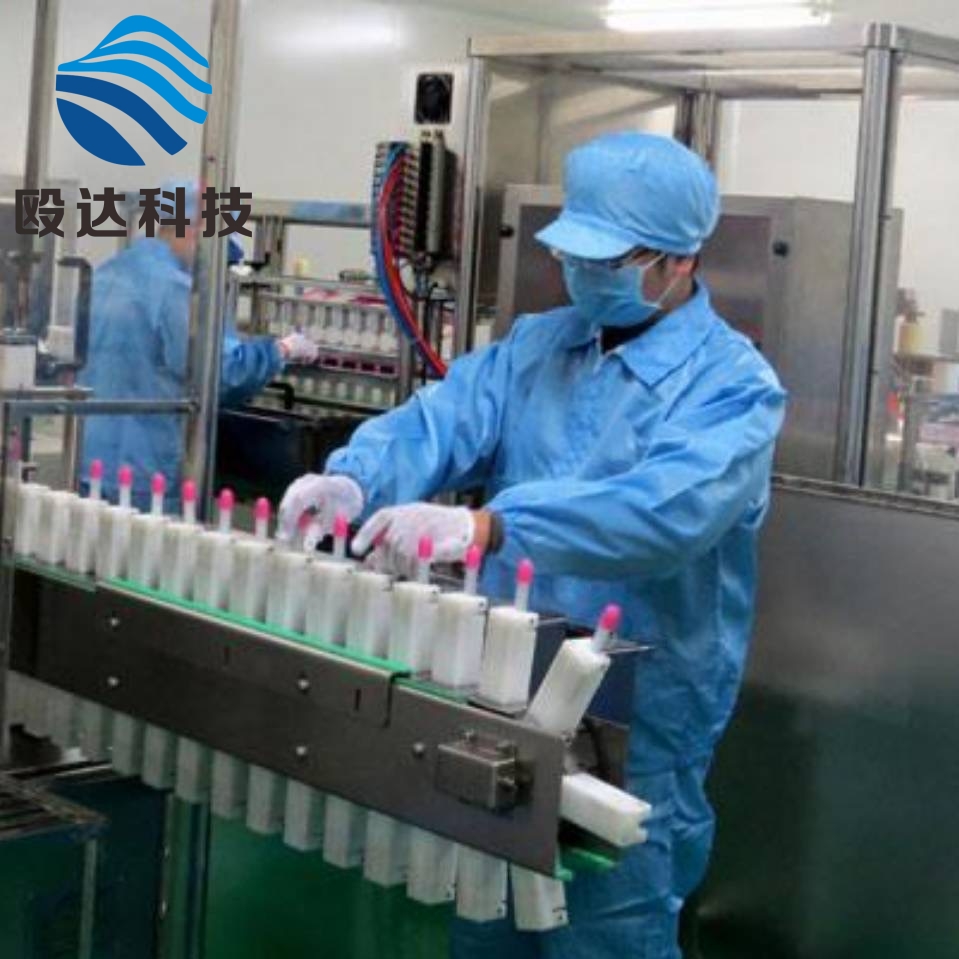-
Categories
-
Pharmaceutical Intermediates
-
Active Pharmaceutical Ingredients
-
Food Additives
- Industrial Coatings
- Agrochemicals
- Dyes and Pigments
- Surfactant
- Flavors and Fragrances
- Chemical Reagents
- Catalyst and Auxiliary
- Natural Products
- Inorganic Chemistry
-
Organic Chemistry
-
Biochemical Engineering
- Analytical Chemistry
- Cosmetic Ingredient
-
Pharmaceutical Intermediates
Promotion
ECHEMI Mall
Wholesale
Weekly Price
Exhibition
News
-
Trade Service
At the beginning of the coronavirus disease ( COVID-19 ) pandemic, global efforts focused on containing the spread of the virus and avoiding infection
.
For now, health professionals should address the overall health of survivors of COVID-19
At the beginning of the coronavirus disease ( COVID-19 ) pandemic, global efforts focused on containing the spread of the virus and avoiding infection
As mentioned earlier, the post-COVID-19 syndrome is characterized by malnutrition, loss of fat-free mass, and low-grade inflammation
.
Therefore, nutritional treatment goals for post-COVID-19 syndrome should focus on correcting nutritional deficiencies to support adequate recovery of physical and functional status and mental health
As mentioned earlier, the post-COVID-19 syndrome is characterized by malnutrition, loss of fat-free mass, and low-grade inflammation
energy intake energy intake
The energy needs of patients with post -COVID-19 syndrome depend on their actual nutritional status
.
During COVID-19 infection, most people experience unintentional weight loss due to increased inflammation, decreased appetite associated with changes in taste/smell, and dysphagia
The energy needs of patients with post -COVID-19 syndrome depend on their actual nutritional status
macronutrients macronutrients
Post-COVID-19 syndrome patients should increase their protein requirements to improve sarcopenia and avoid further wasting of muscle mass
.
Patients should be advised to consume high-quality protein from plant and animal sources, and 15-30 grams of protein per meal, depending on body weight, to ensure all essential amino acids that may have anti-inflammatory effects
Post-COVID-19 syndrome patients should increase their protein requirements to improve sarcopenia and avoid further wasting of muscle mass
In terms of fat intake, a daily intake of 1.
Finally, total carbohydrate intake is not a major concern for patients with post-COVID-19 syndrome
Micronutrients Micronutrients
During the pandemic, the role of nutrition, especially trace elements and vitamins, in regulating immunity has received much attention
.
In fact, a pilot study evaluating the micronutrient status of hospitalized patients with COVID-19 showed micronutrient deficiencies, particularly vitamin D (76%) and selenium (42%)
During the pandemic, the role of nutrition, especially trace elements and vitamins, in regulating immunity has received much attention
.
In fact, a pilot study evaluating the micronutrient status of hospitalized patients with COVID-19 showed micronutrient deficiencies, particularly vitamin D (76%) and selenium (42%)
.
Vitamin D
The role of vitamin D in reducing infection occurs through a variety of mechanisms
.
This includes inducing antimicrobial peptides and defensins, reducing viral survival and replication, and keeping the epithelial layer intact
.
Specific factors associated with COVID-19 infection include decreased concentrations of proinflammatory cytokines and increased levels of ACE2
.
Notably, the effects of vitamin D supplementation on markers of inflammation and oxidative stress have also been studied in other diseases, such as patients with diabetes and hypertension , as well as its effects on calcium metabolism and expression of a broad range of non-calcium genes
.
Another disease associated with low levels of 25-hydroxyvitamin D (25(OH)D) is breast cancer , as high levels of 25-hydroxyvitamin D are associated with a lower risk of breast cancer
.
.
This includes inducing antimicrobial peptides and defensins, reducing viral survival and replication, and keeping the epithelial layer intact
.
Specific factors associated with COVID-19 infection include decreased concentrations of proinflammatory cytokines and increased levels of ACE2
.
Notably, the effects of vitamin D supplementation on markers of inflammation and oxidative stress have also been studied in other diseases, such as patients with diabetes and hypertension , as well as its effects on calcium metabolism and expression of a broad range of non-calcium genes
.
Another disease associated with low levels of 25-hydroxyvitamin D (25(OH)D) is breast cancer , as high levels of 25-hydroxyvitamin D are associated with a lower risk of breast cancer
.
diabetes hypertension breast cancer
Notably, vitamin D deficiency has been reported to be common in patients with cardiovascular disease (CVD)
.
A Mendelian randomization analysis in four population-based cohort studies found an inverse association between low serum concentrations of this vitamin and coronary heart disease, stroke, and all-cause mortality
.
Acharya et al.
observed that in patients with vitamin D deficiency and no history of myocardial infarction , treatment with certain levels of 25(OH)D significantly reduced the risk of death from all causes
.
.
A Mendelian randomization analysis in four population-based cohort studies found an inverse association between low serum concentrations of this vitamin and coronary heart disease, stroke, and all-cause mortality
.
Acharya et al.
observed that in patients with vitamin D deficiency and no history of myocardial infarction , treatment with certain levels of 25(OH)D significantly reduced the risk of death from all causes
.
Vascular myocardial infarction
It is worth mentioning that Schöttker et al.
conducted a meta-analysis examining the relationship between serum 25(OH)D concentrations and mortality in different cohort studies
.
The researchers concluded that although vitamin D levels varied by country, sex, and season, there was a consistent association between 25(OH)D levels and all-cause and cause-specific mortality
.
Thus, it is clear that vitamin D levels have a major impact on several health conditions that patients with COVID-19 may have; therefore, their prognosis will be worse than those without this deficiency
.
conducted a meta-analysis examining the relationship between serum 25(OH)D concentrations and mortality in different cohort studies
.
The researchers concluded that although vitamin D levels varied by country, sex, and season, there was a consistent association between 25(OH)D levels and all-cause and cause-specific mortality
.
Thus, it is clear that vitamin D levels have a major impact on several health conditions that patients with COVID-19 may have; therefore, their prognosis will be worse than those without this deficiency
.
In a cohort study published in 2022, Seal et al.
observed that in a total of 4599 SARS-CoV-2-positive patients, blood 25(OH)D concentrations were independently associated with COVID-19-related hospitalization and mortality, in a dose-dependent manner -Reaction relationship
.
Similar results were obtained in other publications, and these also occurred in patients with comorbidities
.
observed that in a total of 4599 SARS-CoV-2-positive patients, blood 25(OH)D concentrations were independently associated with COVID-19-related hospitalization and mortality, in a dose-dependent manner -Reaction relationship
.
Similar results were obtained in other publications, and these also occurred in patients with comorbidities
.
Therefore, ESPEN guidelines and others recommend that patients consume 100% of the recommended daily intake (RDA)
.
For patients who require higher intakes and who are micronutrient deficient, it is recommended to take a multivitamin and mineral supplement at least once a day
.
International nutritional recommendations recommend the importance of vitamin D intake (400 IU), especially for patients with low sun exposure (ie, prolonged confinement or hospitalization)
.
.
For patients who require higher intakes and who are micronutrient deficient, it is recommended to take a multivitamin and mineral supplement at least once a day
.
International nutritional recommendations recommend the importance of vitamin D intake (400 IU), especially for patients with low sun exposure (ie, prolonged confinement or hospitalization)
.
health products
health supplementsIn addition to the aforementioned nutrients, other bioactive compounds may play a key role in reducing inflammation (immunosuppressants) or improving immune responses (immunostimulators)
.
.
Among immunosuppressants, polyphenols (quercetin, resveratrol, catechin), n-acetylcysteine (NAC) and palmitoylethanolamide (PEA) have shown their antiviral activity, It mainly includes inhibition of inflammatory pathways (eg: NLRP3 inflammasome-mediated IL-β production and secretion of pro-inflammatory cytokines) and viral replication (by inhibiting major viral proteases)
.
In addition, inositol supplementation reduces the cytokine storm characteristic of COVID-19 infection and may also play a key role in recovery
.
On the other hand, increased inflammation is the result of an impaired oxidative state
.
In addition to vitamins and minerals with antioxidant properties, glutathione supplementation improves oxidative damage in a variety of tissues
.
Therefore, the combination of inositol and glutathione may be a useful strategy to improve the inflammatory and oxidative status of patients with post-COVID-19 syndrome
.
.
In addition, inositol supplementation reduces the cytokine storm characteristic of COVID-19 infection and may also play a key role in recovery
.
On the other hand, increased inflammation is the result of an impaired oxidative state
.
In addition to vitamins and minerals with antioxidant properties, glutathione supplementation improves oxidative damage in a variety of tissues
.
Therefore, the combination of inositol and glutathione may be a useful strategy to improve the inflammatory and oxidative status of patients with post-COVID-19 syndrome
.
As for immunostimulants, milk proteins and polypeptides (bovine lactoferrin, lactoperoxidase, serum albumin, β-lactoglobulin and α-lactalbumin) have been used as potent immunostimulants, despite this beneficial effect The mechanism is not fully understood
.
In addition, probiotics, such as lactobacilli and bifidobacteria, may improve immune responses, favor competition with pathogens for colonization in the gut, and maintain gut barrier integrity, thereby reducing permeability to pathogens and their microbial metabolites
.
.
In addition, probiotics, such as lactobacilli and bifidobacteria, may improve immune responses, favor competition with pathogens for colonization in the gut, and maintain gut barrier integrity, thereby reducing permeability to pathogens and their microbial metabolites
.
Finally, some nutritional compounds are thought to be immunomodulators for treating COVID-19 or reducing its symptoms
.
Glycophosphopeptide (AM3) is a glucan phosphopeptide that modulates innate and adaptive immunity
.
Polygonum alba extract is known for its pleiotropic effects on different pathways related to the immune response
.
Glutamine is a conditionally essential amino acid that plays a key role in regulating "cytokine storm" during COVID-19 infection
.
.
Glycophosphopeptide (AM3) is a glucan phosphopeptide that modulates innate and adaptive immunity
.
Polygonum alba extract is known for its pleiotropic effects on different pathways related to the immune response
.
Glutamine is a conditionally essential amino acid that plays a key role in regulating "cytokine storm" during COVID-19 infection
.
Mediterranean diet
mediterranean diet mediterranean diet mediterranean dietThere is growing evidence that dietary intake, including nutrients and non-nutritive bioactive compounds, modulates inflammation and the immune system
.
Therefore, combining different foods with these properties across dietary patterns could serve as a useful nutritional approach for patients with post-COVID-19 syndrome
.
.
Therefore, combining different foods with these properties across dietary patterns could serve as a useful nutritional approach for patients with post-COVID-19 syndrome
.
The Mediterranean diet is characterized by a number of bioactive compounds (monounsaturated and omega-3 fatty acids, as well as vitamins, minerals, and phytochemicals) with anti-inflammatory and antioxidant activity
.
In fact, multiple studies confirm that the Mediterranean diet has anti-inflammatory and immunomodulatory effects on several diseases associated with chronic low-grade inflammation
.
Interestingly, observational studies highlight the association between adherence to the Mediterranean diet and better outcomes (mortality, recovery) in patients with COVID-19 and the risk of COVID-19 infection in different populations
.
Therefore, it is recommended to eat more plant-based foods (fruits, vegetables, whole grains and beans), high-quality animal protein (fish, lean meat, poultry, eggs and low-fat cheeses), and extra virgin olive oil as the main source of fat
.
.
In fact, multiple studies confirm that the Mediterranean diet has anti-inflammatory and immunomodulatory effects on several diseases associated with chronic low-grade inflammation
.
Interestingly, observational studies highlight the association between adherence to the Mediterranean diet and better outcomes (mortality, recovery) in patients with COVID-19 and the risk of COVID-19 infection in different populations
.
Therefore, it is recommended to eat more plant-based foods (fruits, vegetables, whole grains and beans), high-quality animal protein (fish, lean meat, poultry, eggs and low-fat cheeses), and extra virgin olive oil as the main source of fat
.
Finally, adequate hydration (30ml/kg actual body weight) is essential for the complete recovery of patients with post-COVID-19 syndrome
.
Therefore, these patients should increase their daily fluid intake (2.
5-3 L/day) by drinking water, milk, juice, broth, sports drinks, coffee, and tea
.
.
Therefore, these patients should increase their daily fluid intake (2.
5-3 L/day) by drinking water, milk, juice, broth, sports drinks, coffee, and tea
.
In conclusion, patients with post-COVID-19 syndrome require individualized assessment of nutritional status to detect potential nutritional and non-nutrient deficiencies, and to improve physical and mental complications and overall health
.
Patients should be advised to consume several foods that naturally contain bioactive compounds with anti-inflammatory and immunostimulatory activities
.
A Mediterranean diet may be a useful strategy for this purpose
.
Supplements and nutraceuticals should be recommended for malnourished and undernourished patients, as well as those with long-term physical complications associated with COVID-19 infection (Figure 1)
.
.
Patients should be advised to consume several foods that naturally contain bioactive compounds with anti-inflammatory and immunostimulatory activities
.
A Mediterranean diet may be a useful strategy for this purpose
.
Supplements and nutraceuticals should be recommended for malnourished and undernourished patients, as well as those with long-term physical complications associated with COVID-19 infection (Figure 1)
.
Although evidence on nutritional management of patients with post-COVID-19 syndrome remains scant, all the recommendations reported in this review are likely to be effective in influencing the main pathophysiological mechanisms of post-COVID-19 syndrome (Figure 2)
.
It must be emphasized that some of the information reported in this review was obtained in treatment studies dealing with diseases with similar outcomes and not specifically for post-COVID-19 syndrome
.
Therefore, further studies in patients with post-COVID-19 syndrome are needed to provide the best clinical avenues for dealing with this novel disease
.
.
It must be emphasized that some of the information reported in this review was obtained in treatment studies dealing with diseases with similar outcomes and not specifically for post-COVID-19 syndrome
.
Therefore, further studies in patients with post-COVID-19 syndrome are needed to provide the best clinical avenues for dealing with this novel disease
.
Original source:
Original source:Barrea L, Grant WB, Frias-Toral E, et al.
Dietary Recommendations for Post-COVID-19 Syndrome.
Nutrients.
2022;14(6):1305.
Published 2022 Mar 20.
doi:10.
3390/nu14061305
Dietary Recommendations for Post-COVID-19 Syndrome.
Nutrients.
2022;14(6):1305.
Published 2022 Mar 20.
doi:10.
3390/nu14061305Leave a comment here







